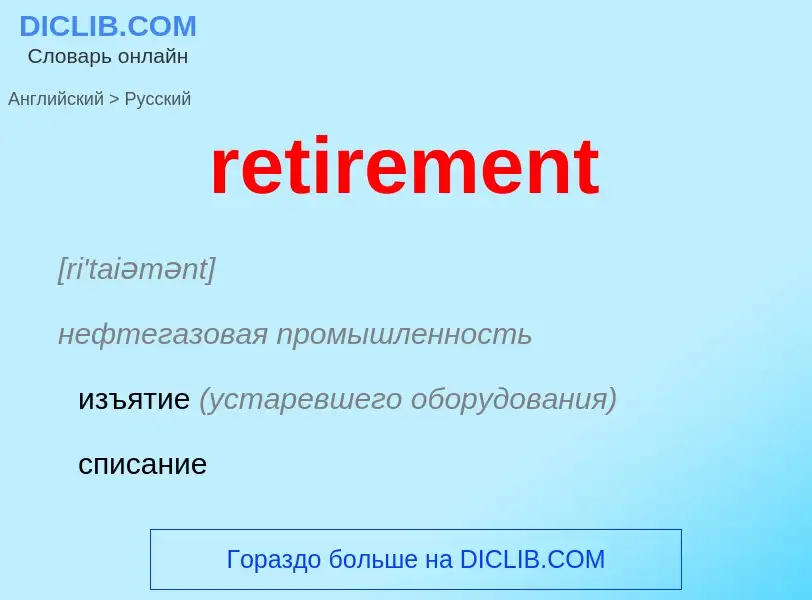ترجمة وتحليل الكلمات عن طريق الذكاء الاصطناعي ChatGPT
في هذه الصفحة يمكنك الحصول على تحليل مفصل لكلمة أو عبارة باستخدام أفضل تقنيات الذكاء الاصطناعي المتوفرة اليوم:
- كيف يتم استخدام الكلمة في اللغة
- تردد الكلمة
- ما إذا كانت الكلمة تستخدم في كثير من الأحيان في اللغة المنطوقة أو المكتوبة
- خيارات الترجمة إلى الروسية أو الإسبانية، على التوالي
- أمثلة على استخدام الكلمة (عدة عبارات مع الترجمة)
- أصل الكلمة
retirement - ترجمة إلى الروسية
[ri'taiəmənt]
нефтегазовая промышленность
изъятие (устаревшего оборудования)
списание
существительное
общая лексика
демонтаж
снижение (уровня реки)
отставка
выход в отставку или на пенсию
уединение
уединённая жизнь
уединенная жизнь
страхование
выход в отставку
выход [уход] на пенсию
демография
пенсия
пенсионный возраст (период в жизни человека, начинающийся после достижения им определенного возраста и отхода от активной трудовой деятельности)
финансы
изъятие из обращения
выкуп
погашение
выплата долга (ценных бумаг (акций и облигаций), долговых обязательств в результате их выкупа)
оплата (векселя)
списывание за непригодностью (оборудования и т. п.)
экономика
оплата
выплата
бухгалтерский учет
выбытие (изъятие капитального актива из баланса предприятия в результате его продажи или истечения срока полезной службы)
демонтированная единица оборудования
юриспруденция
(уход присяжных из зала суда на совещание (для вынесения вердикта))
военное дело
выход из боя
планомерный отход
отступление, отход
Смотрите также
2) выбытие (оборудования); демонтаж
3) демонтированная единица (оборудования)
4) отставка; выход на пенсию
- compulsory retirement
- mandatory retirement
- physical disability retirement
تعريف
ويكيبيديا

Retirement is the withdrawal from one's position or occupation or from one's active working life. A person may also semi-retire by reducing work hours or workload.
Many people choose to retire when they are elderly or incapable of doing their job due to health reasons. People may also retire when they are eligible for private or public pension benefits, although some are forced to retire when bodily conditions no longer allow the person to work any longer (by illness or accident) or as a result of legislation concerning their positions. In most countries, the idea of retirement is of recent origin, being introduced during the late-nineteenth and early-twentieth centuries. Previously, low life expectancy, lack of social security and the absence of pension arrangements meant that most workers continued to work until their death. Germany was the first country to introduce retirement benefits in 1889.
Nowadays, most developed countries have systems to provide pensions on retirement in old age, funded by employers or the state. In many poorer countries, there is no support for the elderly beyond that provided through the family. Today, retirement with a pension is considered a right of the worker in many societies; hard ideological, social, cultural and political battles have been fought over whether this is a right. In many Western countries, this is a right embodied in national constitutions.
An increasing number of individuals are choosing to put off this point of total retirement, by selecting to exist in the emerging state of pre-tirement.




